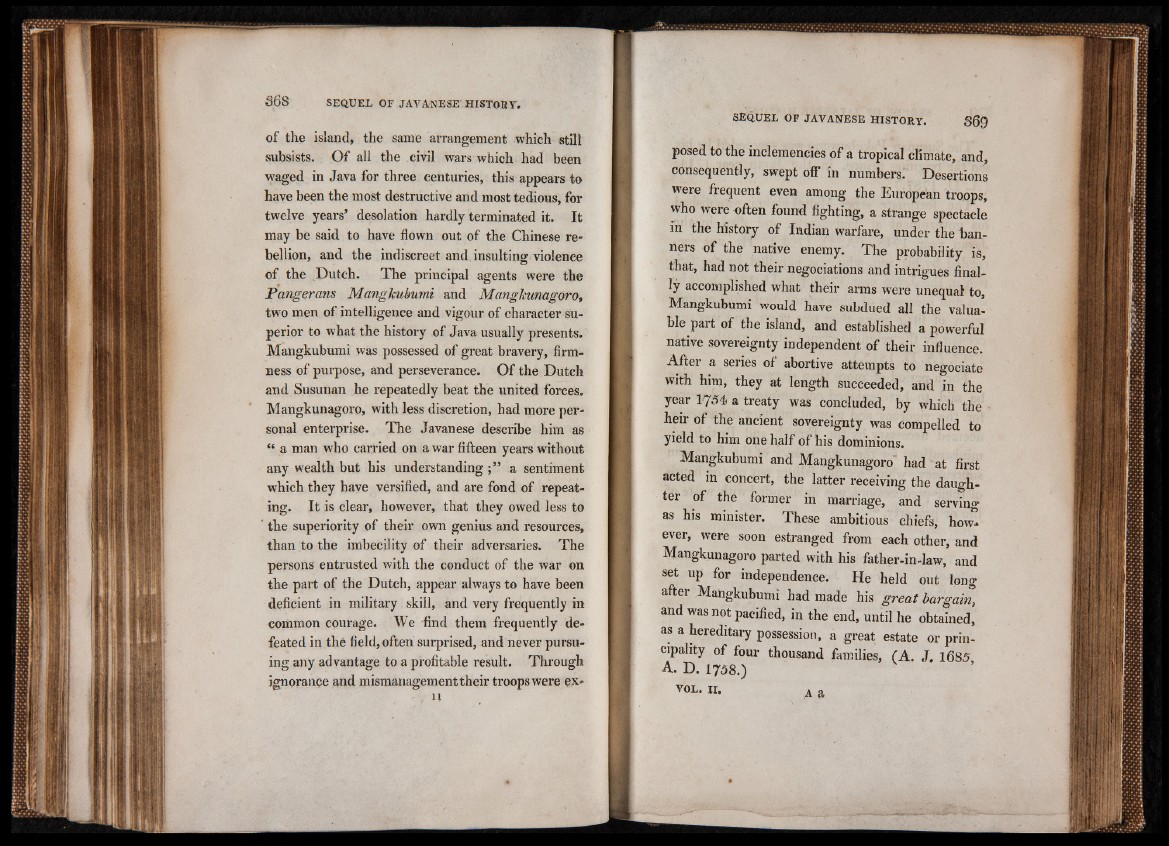
of the island, the same arrangement which still
subsists. Of all the civil wars which had been
waged in Java for three centuries, this appears to
have been the most destructive and most tedious, for
twelve years’ desolation hardly terminated it. It
may be said to have flown out of the Chinese rebellion,
and the indiscreet and insulting violence
of the Dutch. The principal agents were the
JP anger ans Mangkubn mi and Mangkunagoro,
two men of intelligence and vigour of character superior
to what the history of Java usually presents.
Mangkubumi was possessed of great bravery, firmness
of purpose, and perseverance. Of the Dutch
and Susunan he repeatedly beat the united forces.
Mangkunagoro, with less discretion, had more personal
enterprise. The Javanese describe him as
% a man who carried on a war fifteen years without
any wealth but his understanding;” a sentiment
which they have versified, and are fond of repeating.
It is clear, however, that they owed less to
' the superiority of their own genius and resources,
than to the imbecility of their adversaries. The
persons entrusted with the conduct of the war on
the part of the Dutch, appear always to have been
deficient in military skill, and very frequently in
common courage. We find them frequently defeated
in thé field, often surprised, and never pursuing
any advantage to a profitable result. Through
ignorance and mismanagement their troops were ex»
- . u
posed to the inclemencies of a tropical climate, and,
consequently, swept off in numbers. Desertions
were frequent even among the European troops,
who were often found fighting, a strange spectacle
in the history of Indian warfare, under the banners
of the native enemy. The probability is,
that, had not their négociations and intrigues finally
accomplished what their arms were unequal to,
Mangkubumi would have subdued all the valuable
part of the island, and established a powerful
native sovereignty independent of their influence.
After a series of abortive attempts to negociate
with him, they at length succeeded, and in the
year 1754. a treaty was concluded, by which the
heir of the ancient sovereignty was compelled to
yield to him one half of his dominions.
Mangkubumi and Mangkunagoro" had at first
acted in concert, the latter receiving the daughter
of the former in marriage, and serving
as his minister. These ambitious chiefs, however,
were soon estranged from each other, and
Mangkunagoro parted with his father-in-law, and
set up for independence. He held out long
after Mangkubumi had made his great bargain,
and was not pacified, in the end, until he obtained,
as a hereditary possession, a great estate or principality
of four thousand families, (A. J. 1685
A. D. 1758.)
v o l . i i . a a